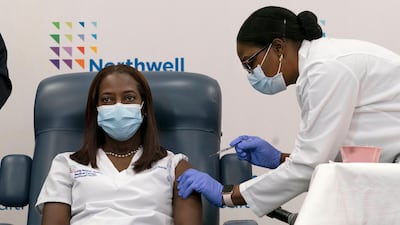An empty vial that contained the first dose of the coronavirus vaccine in the US has been acquired by the Smithsonian Institution.
The vial will be part of a 2022 exhibit at the National Museum of American History, which will explore the US efforts of containing and curing various diseases, including Covid-19.
The acquisition also includes the vaccination card and scrubs of Sandra Lindsay, the New York nurse who became the first person in the US to be vaccinated against Covid-19 when she received the Pfizer-BioNTech vaccine on December 14.
"These now-historic artefacts document not only this remarkable scientific progress but represent the hope offered to millions living through the cascading crises brought on by Covid-19," Anthea M Hartig, the museum's director, said.
The objects were donated to the museum by Northwell Health, the New York healthcare provider that administered the first doses of the vaccine. Its donations included empty vials of Pfizer-BioNTech and Moderna vaccines as well as the specialised shipping container that transported the vaccine, which was packed in dry ice.
“We wanted objects that would tell the full story,” Ms Hartig said.
The donated items will be part of the museum's large collection of health-related artefacts, which includes the penicillin mould from Alexander Fleming, the original polio vaccine developed in 1955 by Jonas Salk as well as 19th-century patent medicines.
It is not yet clear whether the new acquisitions will be put on display when the museum reopens later this year.
The museum closed on March 13, 2020, and, after briefly reopening again in September, closed again as case numbers in the US began to rise.
The Covid-related items will be showcased in a 2022 exhibit called In Sickness and In Health, which will examine "200 years of medicine in the US including Covid-19".
"Our broadest mandate was to document this extraordinary period we were going through" Diane Wendt, a curator in the museum's medicine and science department, told The Guardian. "We particularly had our eye on vaccine development from the start."


